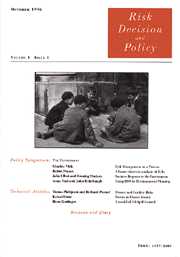Article contents
Confidence judgments as expressions of experienced decision conflict
Published online by Cambridge University Press: 01 April 2000
Abstract
This study tested between two interpretations of confidence in diagnostic hypotheses: expected probability of being correct and conflict experienced during the diagnostic process. Physicians generated hypotheses for case histories with two plausible diagnoses, one having a higher population base rate but less severe clinical consequences than the other. Case information indicative of the two diagnoses was varied. Generation proportions for the two diagnoses and confidence judgments both deviated from the predictions of a Bayesian belief model, but in different ways. Generation of a hypothesis increased with diagnosis-consistent information and diagnosis base rates, but was not reduced by diagnosis-inconsistent information. Confidence was sensitive to both consistent and inconsistent information, but was not very sensitive to diagnosis base rates. Physician characteristics also affected hypothesis generation and confidence differentially. Female doctors had lower confidence in their diagnoses than male doctors, yet there were no gender differences in hypothesis generation. Experience affected hypothesis generation monotonically via the increased availability of previously diagnosed cases, while confidence first increased and then decreased with doctors' experience. The results are consistent with an interpretation of confidence judgments as an expression of decision conflict rather than an indication of likely diagnosis accuracy.
- Type
- Technical article
- Information
- Copyright
- © Cambridge University Press, 2000
- 6
- Cited by




